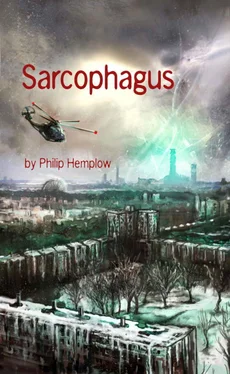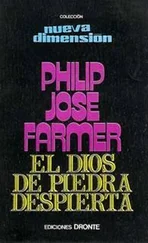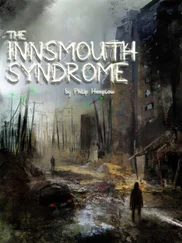Not a car: a wheelbarrow. She was being pushed through the forest in a large wheelbarrow, her legs dangling off the front of it. Who, then, was pushing her? She tilted her head back.
A grim-faced man, his stubbled cheeks inflated with effort, was leaning into the task of forcing the overloaded cart through the detritus of the forest floor. He looked down and gave her a curt nod. “ Pryvit. ” His voice was clipped, his concentration focussed on pushing the barrow without spilling her onto the ground. “Nearly there,” he assured her, as an afterthought.
‘Nearly where?’ wondered Victoria, but she was still too traumatised to ask. He seemed to know what he was doing—and he didn’t have the head of a dog. Had that really happened? She could still feel gritty particles of bark on her scraped hands, could still taste the appalling animal stench that had emanated from the haunter of the woods. It had happened, there was no doubt.
She wondered who her chauffeur was. He wasn’t from Octra, she was certain of that. A frayed rifle-sling cut across his thick, black bodywarmer, and the barrel of a Fort hunting carbine protruded over his shoulder. He could only be one of the samosely , the civilians who eked out a living in the Zone. Many of them had lived there before the events of 1986, returning illegally after the State confiscated their homes. Others were scavengers and hermits who had migrated to the Zone in the years since, for impenetrable reasons of their own. They kept low profiles and lived solitary, impoverished lives in the ruins, choosing the dangers of radiation over the problems of the outside world.
The trees began to thin out and the going became easier as they reached the far side of the wood. The samosely was pushing her towards a house, Victoria realised: a derelict farmhouse with an electric bulb glowing above the door. She remembered the light she had seen while running through the forest, the one she had tried to reach. Her saviour—as she presumed him—must have left it on to guide him home from his evening’s hunt.
She began to feel stupid, being wheeled along like a prize marrow, and the edge of the barrow was digging painfully into the backs of her knees. She flapped her arm to signal the man to stop pushing. “Let me get out,” she muttered, her voice thick and drunken-sounding.
“It is just there, we are nearly there,” the man assured her, but he slowed to a halt anyway and raised the handles, pouring her onto her feet.
Her joints screamed as she straightened up, bones and muscles registering protests at their ongoing abuse. For a few seconds her vision swam alarmingly, until her circulatory system kicked into a higher gear, better suited to standing. Her left shoulder felt tight, stiffened like cooked meat. She guessed that she must have landed on it after her dive from the tree. It was uncomfortable but she could move it. No breakage or dislocation.
The man stood close, ready to catch her if she should fall. When it became clear that she wouldn’t, he took hold of the barrow again and began to lead the way towards the crumbling farmhouse. “Come indoors,” he said over his shoulder. “It is warm.”
Victoria followed slowly. She still felt faint, and began to wonder if she had made a mistake by insisting on walking. With a start she noticed a large, dark smear on the sleeve of her coat. She rubbed at it with her fingers. As they passed into the arc of light from the bulb above the door, she saw that they came away red. Was she bleeding? No. The wheelbarrow was coated in a dark, gory emulsion that had rubbed off on her clothes. It must have been used by the samosely for transporting the carcasses of his nightly kills, she guessed. Tonight he had bagged her instead.
He walked straight into the house without waiting for her, leaving the door open. Victoria hesitated for a few moments before following. She did not feel entirely comfortable walking into his home. No one knew where she was. She didn’t know where she was. On the other hand, the hunter hadn’t attempted to harm her and had, presumably, saved her from the dogs. The dogs. She did not want to go back into the woods and risk another encounter with those dogs. Swallowing her trepidation, she crossed the threshold.
It was like travelling back in time. Victoria found herself standing in a small parlour that had seemingly not been altered since the early 1980s. Blocky, utilitarian slabs of Soviet upholstery were placed around the room, drably clashing with stained, sky-blue wallpaper and garish rugs, that had been mounted on the wall in the inexplicable fashion of communism’s terminal decade.
The samosely pulled off his bodywarmer and dropped it on a lurid green sofa. He was younger than Victoria had supposed, probably thirty rather than forty, with a face that was lined by stress and emotion rather than age. His fringe was grown long to hide a dramatic-looking scar on his forehead. It looked like a chemical burn.
“You are thirsty?” called the man, pushing through another door that opened into a dingy kitchen.
“Yes. Thankyou,” replied Victoria, hoping to be offered water rather than vodka. She followed him through.
The kitchen was more obviously lived-in than the parlour. The ceiling was covered by ominous damp patches, and dirt was ingrained between the tiles of the floor, but it was basically clean. Two dead hares hung over the sink, waiting to be skinned. Victoria wondered how much radiation was stored in their tissues, and decided to decline any offers of food.
Her host decanted water from a plastic bottle into a cheap, beveled glass and offered it to her. She wondered briefly about where it had been collected, but pushed the thought away and drank. It was warm, but fresh. She finished it in one long draught, and then sank gratefully into a creaking chair at the kitchen table.
“You are from Prypiat?” asked the man, refilling her glass. “From the camp there, yes?”
Victoria nodded tiredly. “Yes. My car broke down. I was chased by dogs.”
“I saw. You are hiding in a tree. I think I scare you when I fire my gun, and you fall. I shoot some dogs, the rest run away. Are you hurt?”
“Did you see it?” Victoria demanded to know, raising her head. “Did you see the thing in the tree?”
“Thing in tree? No. Only you I see in tree—but it is dark, and I am not near. What is in tree?”
“Nothing,” sighed Victoria. “You wouldn’t believe me. I don’t believe me.”
“Your hand shake,” observed the man. He reached into a cupboard, producing a bottle and two more glasses. “You need drink!”
Ignoring her protestations, he sloshed two large measures of vodka into the glasses and pushed one across the table to her. “Drink! This is Chernobyl! A little vodka keeps away the radiation. Za zdorovie !” He drained his glass and gestured at her until she did the same. The cheap spirit scoured her throat, dripping into her stomach and instantly dissolving the knot of tension she hadn’t realised was there. It felt good. She was pregnant though, she remembered. Probably shouldn’t drink any more.
“I have seen the building you have been making” began her host, but he was interrupted by the creaking of the kitchen door. A bony hand clutched at it, trembling with effort, and an impossibly small and frail-looking old woman hobbled slowly into the room. She was swaddled in innumerable layers of frayed and tattered fabric; the remnants of nightshirts, and jumpers, and scarves, and gowns.
The man sighed and went to help her. “My grandmother,” he explained over his shoulder. “This is her home. She should be in bed!”
“Why do you speak English?” the old woman demanded to know, batting away his hands as he tried to steady her. “Stupid boy! Who is here?” She peered in Victoria’s direction. Victoria stared back, not liking the shrewd, calculating look on the babushka’s face.
Читать дальше











